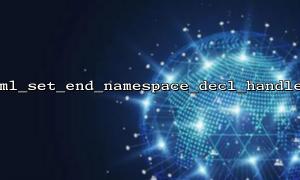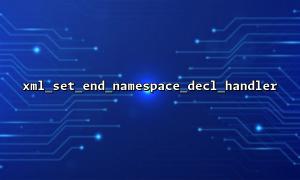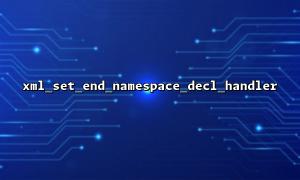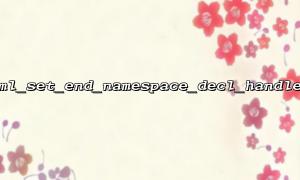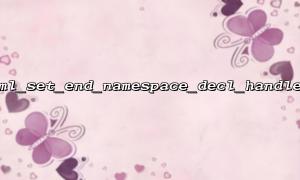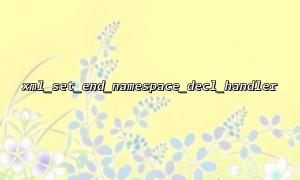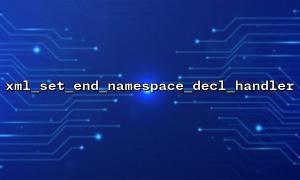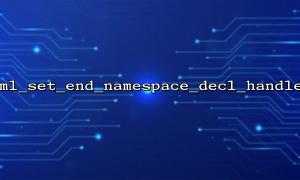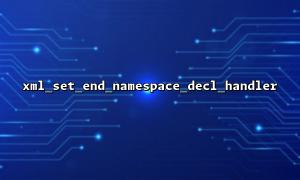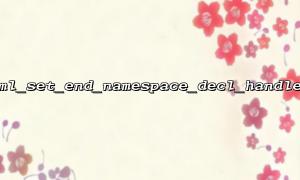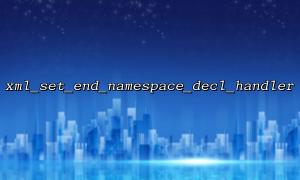The callback function of xml_set_end_namespace_decl_handler needs to accept two parameters: parser and namespaceURI . Where, parser is the handle of the XML parser and namespaceURI is the URI of the namespace. When the definition of the callback function does not meet the requirements, it will cause the program to report an error or the function cannot work normally.
The correct callback function definition should be as follows:
function endNamespaceDeclHandler($parser, $namespaceURI) {
// Logic for handling namespace ending
echo "Namespace URI: $namespaceURI\n";
}
If the number, order or type of the callback function does not match the number, order, or type, the PHP parser will not call the function correctly, and may even throw an error directly.
When using xml_set_end_namespace_decl_handler , you need to make sure that the callback function is correctly bound to the XML parser instance. You can set the callback through the following code:
$parser = xml_parser_create();
xml_set_end_namespace_decl_handler($parser, 'endNamespaceDeclHandler');
If the callback function is not bound correctly, or the bound callback function does not exist, the namespace end event during parsing will not be triggered.
In the endNamespaceDeclHandler callback, the parser parameter should always be a valid XML parser resource. Typically, xml_parser_create() returns a valid parser handle, but if for some reason the parser instance is not created correctly, it may result in parameter errors.
You can check whether the parser is created correctly by:
$parser = xml_parser_create();
if (!$parser) {
die("Failed to create XML parser");
}
Additionally, namespaceURI is a string representing the URI of the namespace. Make sure it is a valid string type, not a NULL or other type of variable.
When calling xml_set_end_namespace_decl_handler , the parser must be in the correct state. If the callback function is not set correctly before parsing the XML file, or if another function (such as xml_parser_free() ) is called during parsing, the callback will not be executed normally.
Here is a complete example showing how to correctly use the xml_set_end_namespace_decl_handler callback function.
function endNamespaceDeclHandler($parser, $namespaceURI) {
echo "Namespace URI: $namespaceURI\n";
}
// create XML Parser
$parser = xml_parser_create();
// Set the callback function that ends the namespace
xml_set_end_namespace_decl_handler($parser, 'endNamespaceDeclHandler');
// Analysis XML data
$data = '<?xml version="1.0"?>
<root xmlns:foo="http://www.example.com/foo">
<foo:bar>Content</foo:bar>
</root>';
xml_parse($parser, $data);
// 释放Parser
xml_parser_free($parser);
Check the execution of the callback function : By adding echo or var_dump to the callback function, you can see whether the callback is triggered correctly and the actual value of the parameter.
Check XML parsing errors : Using the xml_get_error_code and xml_get_current_line_number functions can help you locate the specific location of the parsing errors.
$error_code = xml_get_error_code($parser);
$error_line = xml_get_current_line_number($parser);
echo "Error code: $error_code, Line: $error_line\n";
Step by step debugging : Check the code line by line to ensure that each step is executed correctly, especially the creation of the parser, the setting of the callback, and the beginning and end of the parsing.
The use of the xml_set_end_namespace_decl_handler callback function is very straightforward, but common parameter errors can lead to parsing failures or incorrect output. These common errors can be effectively avoided by ensuring the correct definition of the callback function, parameter type check, parser status check, etc. For complex XML data, step-by-step debugging and checking error information is also a good way to troubleshoot problems.
Hope the answers in this article will be helpful to you in solving your problem!
